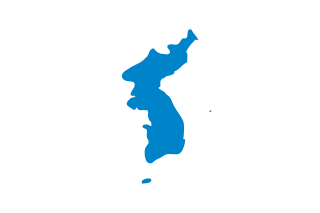Related Research Articles

Korea is a peninsular region in East Asia. Since 1945, it has been divided at or near the 38th parallel, with North Korea comprising its northern half and South Korea comprising its southern half. Korea consists of the Korean Peninsula, Jeju Island, and several minor islands near the peninsula. The peninsula is bordered by China (Manchuria) to the north and Russia to the northeast, across the Amrok and Duman rivers. It is separated from Japan to the southeast by the Korea Strait.

Korean is the native language for about 80 million people, mostly of Korean descent. It is the official and national language of both North Korea and South Korea. The two countries have established standardized norms for Korean, and the differences between them are similar to those between Standard Chinese in mainland China and Taiwan, but political conflicts between the two countries have highlighted the differences between them. North Korea criminalizes the use of the South's standard language, and South Korean education and media often portray the North's language as alien and uncomfortable.

The Korean War was fought between North Korea and South Korea from 1950 to 1953. The war began on 25 June 1950 when North Korea invaded South Korea following clashes along the border and rebellions in South Korea. North Korea was supported by China and the Soviet Union while South Korea was supported by the United States and allied countries. The fighting ended with an armistice on 27 July 1953.

North Korea, officially the Democratic People's Republic of Korea (DPRK), is a country in East Asia. It constitutes the northern half of the Korean Peninsula and borders China and Russia to the north at the Yalu (Amnok) and Tumen rivers, and South Korea to the south at the Korean Demilitarized Zone. North Korea's border with South Korea is a disputed border as both countries claim the entirety of the Korean Peninsula. The country's western border is formed by the Yellow Sea, while its eastern border is defined by the Sea of Japan. North Korea, like its southern counterpart, claims to be the legitimate government of the entire peninsula and adjacent islands. Pyongyang is the capital and largest city.

South Korea, officially the Republic of Korea, is a country in East Asia. It constitutes the southern part of the Korean Peninsula and borders North Korea along the Korean Demilitarized Zone. The country's western border is formed by the Yellow Sea, while its eastern border is defined by the Sea of Japan. South Korea claims to be the sole legitimate government of the entire peninsula and adjacent islands. It has a population of 51.96 million, of which roughly half live in the Seoul Capital Area, the fourth most populous metropolitan area in the world. Other major cities include Incheon, Busan, and Daegu.

Kim Jong Il was a North Korean politician who was the second supreme leader of North Korea from 1994 to 2011. He led North Korea from the 1994 death of his father Kim Il Sung, the first Supreme Leader, until his own death in 2011, when he was succeeded by his son, Kim Jong Un.

A Korean name consists of a family name followed by a given name, as used by the Korean people in both South Korea and North Korea. In the Korean language, ireum or seongmyeong usually refers to the family name (seong) and given name together. Korean names are descended from Chinese names as part of Sino-Korean vocabulary.

Kimchi, is a traditional Korean banchan consisting of salted and fermented vegetables, most commonly using napa cabbage or Korean radish. A wide selection of seasonings are used, including gochugaru, spring onions, garlic, ginger, and jeotgal, etc. Kimchi is also used in a variety of soups and stews. Kimchi is a staple food in Korean cuisine and is eaten as a side dish with almost every Korean meal.

Kwon Bo-ah, known professionally as BoA, is a South Korean singer, songwriter, dancer, producer and actress. One of the most successful and influential Korean entertainers, she has been dubbed the "Queen of K-pop".

Comfort women or comfort girls were women and girls forced into sexual slavery by the Imperial Japanese Army in occupied countries and territories before and during World War II. The term "comfort women" is a translation of the Japanese ianfu (慰安婦), which literally means "comforting, consoling woman". During World War II, Japanese troops forced hundreds of thousands of women from Korea, the Philippines, Vietnam, China, and other countries into brothels where they were sexually enslaved and repeatedly raped. Many women died or committed suicide due to brutal mistreatment and sustained physical and emotional distress. After the war, Japan's acknowledgment of the comfort women's plight was minimal, lacking a full apology and appropriate restitution, which damaged Japan's reputation in Asia for decades.

Manhwa is the general Korean term for comics and print-cartoons. Outside Korea, the term usually refers to South Korean comics. Manhwa is greatly influenced by Japanese Manga comics. Modern Manhwa has extended its reach to many other countries. These comics have branched outside of Korea by access of Webtoons and have created an impact that has resulted in many movie and television show adaptations.

Jung Ji-hoon, better known by his stage name Rain, is a South Korean singer, songwriter, dancer, actor, and record producer. Rain's musical career includes seven albums, 28 singles and numerous concert tours around the world. He achieved breakthrough success with his third Korean album, It's Raining (2004), which spawned the number one single of the same name. The album sold a million copies in Asia, and established Rain as an international star.

TVXQ, an initialism for Tong Vfang Xien Qi, is a South Korean male pop duo consisting of U-Know Yunho and Max Changmin. They are known as Tohoshinki in Japanese releases, and are sometimes referred to as DBSK, an abbreviation of their Korean name Dong Bang Shin Ki (Korean: 동방신기). Their name roughly translates to "Rising Gods of the East".

The Korean Wave or Hallyu is a cultural phenomenon in which the global popularity of South Korean popular culture has dramatically risen since the 1990s. Worldwide interest in Korean culture has been led primarily by the spread of K-pop and K-dramas, with keystone successes including BTS and Psy's "Gangnam Style", as well as Jewel in the Palace, Winter Sonata, and Squid Game. The Korean Wave has been recognized as a form of soft power and as an important economic asset for South Korea, generating revenue through both exports and tourism.

Super Junior , also known as SJ or SuJu, is a South Korean boy band composed of Leeteuk, Heechul, Yesung, Shindong, Sungmin, Eunhyuk, Donghae, Siwon, Ryeowook and Kyuhyun. Han Geng, Kibum and Kangin were originally part of the group before departing in 2011, 2015 and 2019, respectively. The group was formed by the founder of SM Entertainment, Lee Soo-man in 2005 as a 12-piece group with rotational members but the concept was abandoned after addition of Kyuhyun in 2006. They are also dubbed by the media as the "King of Hallyu Wave" due to their prominent contributions in Korean Wave.

The Liancourt Rocks, also known by their Korean name of Dokdo or their Japanese name of Takeshima, are a group of islets in the Sea of Japan between the Korean peninsula and the Japanese archipelago, administered by South Korea. The Liancourt Rocks comprise two main islets and 35 smaller rocks; the total surface area of the islets is 0.187554 square kilometres and the highest elevation of 168.5 metres (553 ft) is on the West Islet. The Liancourt Rocks lie in rich fishing grounds that may contain large deposits of natural gas. The English name Liancourt Rocks is derived from Le Liancourt, the name of a French whaling ship that came close to being wrecked on the rocks in 1849.

Shinee is a South Korean boy band formed by SM Entertainment in 2008. The group's musical impact in their native country has earned them numerous accolades and the title "Princes of K-pop". The group currently is composed of four members: Onew, Key, Minho, and Taemin. Originally a five-piece group, vocalist Jonghyun died in December 2017.

Seoul, officially known as the Seoul Special City, is the capital and largest metropolis of the Republic of Korea. According to the 2020 census, Seoul has a population of 9.9 million people, and forms the heart of the Seoul Capital Area with the surrounding Incheon metropolis and Gyeonggi province. Considered to be a global city and rated as an Alpha – City by Globalization and World Cities Research Network (GaWC), Seoul was the world's fourth largest metropolitan economy in 2014, following Tokyo, New York City and Los Angeles.

Im Yoon-ah, known mononymously as Yoona, is a South Korean singer and actress. After training for five years, she debuted as a member of girl group Girls' Generation in August 2007, which went on to become one of the best-selling artists in South Korea and one of South Korea's most popular girl groups worldwide. Apart from her group's activities, Yoona has participated in various television dramas, notably You Are My Destiny (2008), which marked her career breakthrough and earned her the Best New Actress awards at the 23rd KBS Drama Awards and the 45th Baeksang Arts Awards.

The Korean alphabet, known as Hangul in South Korea and Chosŏn'gŭl in North Korea, is the modern official writing system for the Korean language. The letters for the five basic consonants reflect the shape of the speech organs used to pronounce them, and they are systematically modified to indicate phonetic features; similarly, the vowel letters are systematically modified for related sounds, making Hangul a featural writing system. It has been described as a syllabic alphabet as it combines the features of alphabetic and syllabic writing systems, although it is not necessarily an abugida.
References
- ↑ 김현승 (in Korean). K-League. Archived from the original on October 18, 2008. Retrieved 2009-09-15.